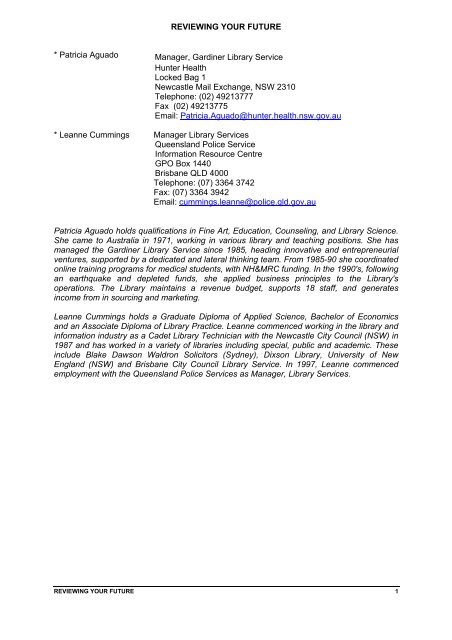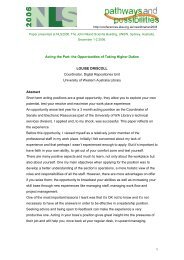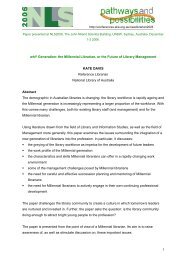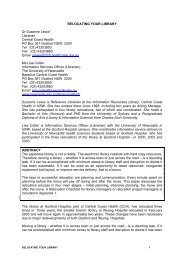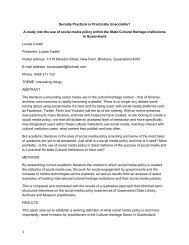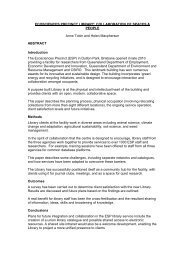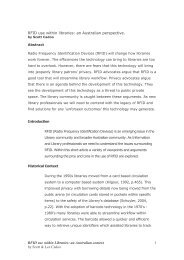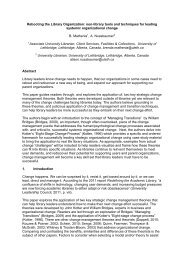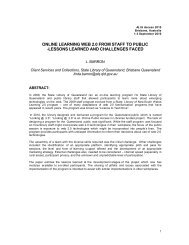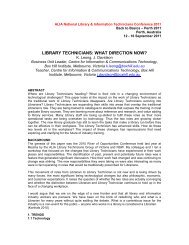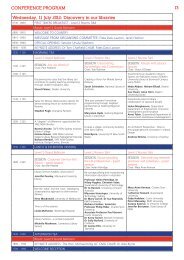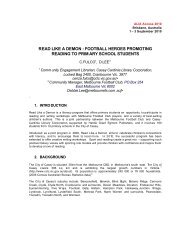REVIEWING YOUR FUTURE * Patricia Aguado ... - ALIA conferences
REVIEWING YOUR FUTURE * Patricia Aguado ... - ALIA conferences
REVIEWING YOUR FUTURE * Patricia Aguado ... - ALIA conferences
You also want an ePaper? Increase the reach of your titles
YUMPU automatically turns print PDFs into web optimized ePapers that Google loves.
* <strong>Patricia</strong> <strong>Aguado</strong><br />
<strong>REVIEWING</strong> <strong>YOUR</strong> <strong>FUTURE</strong><br />
Manager, Gardiner Library Service<br />
Hunter Health<br />
Locked Bag 1<br />
Newcastle Mail Exchange, NSW 2310<br />
Telephone: (02) 49213777<br />
Fax (02) 49213775<br />
Email: <strong>Patricia</strong>.<strong>Aguado</strong>@hunter.health.nsw.gov.au<br />
* Leanne Cummings Manager Library Services<br />
Queensland Police Service<br />
Information Resource Centre<br />
GPO Box 1440<br />
Brisbane QLD 4000<br />
Telephone: (07) 3364 3742<br />
Fax: (07) 3364 3942<br />
Email: cummings.leanne@police.qld.gov.au<br />
<strong>Patricia</strong> <strong>Aguado</strong> holds qualifications in Fine Art, Education, Counseling, and Library Science.<br />
She came to Australia in 1971, working in various library and teaching positions. She has<br />
managed the Gardiner Library Service since 1985, heading innovative and entrepreneurial<br />
ventures, supported by a dedicated and lateral thinking team. From 1985-90 she coordinated<br />
online training programs for medical students, with NH&MRC funding. In the 1990's, following<br />
an earthquake and depleted funds, she applied business principles to the Library's<br />
operations. The Library maintains a revenue budget, supports 18 staff, and generates<br />
income from in sourcing and marketing.<br />
Leanne Cummings holds a Graduate Diploma of Applied Science, Bachelor of Economics<br />
and an Associate Diploma of Library Practice. Leanne commenced working in the library and<br />
information industry as a Cadet Library Technician with the Newcastle City Council (NSW) in<br />
1987 and has worked in a variety of libraries including special, public and academic. These<br />
include Blake Dawson Waldron Solicitors (Sydney), Dixson Library, University of New<br />
England (NSW) and Brisbane City Council Library Service. In 1997, Leanne commenced<br />
employment with the Queensland Police Services as Manager, Library Services.<br />
<strong>REVIEWING</strong> <strong>YOUR</strong> <strong>FUTURE</strong> 1
10th Asia Pacific Special Health and Law Librarians Conference – Adelaide 24–27 Aug 2003<br />
Abstract<br />
The Gardiner Library Service (GLS) provides highly dynamic, entrepreneurial and cutting<br />
edge services to Hunter Health (HH) (New South Wales Department of Health) clients and<br />
associates, geographically dispersed over 28,000 square kilometres.<br />
Its main focus is to provide an information framework which progresses HH’s goal to be the<br />
“leader in creating healthier communities” and “a leader in health research and development”<br />
(Hunter Health Corporate Plan 2000-2004). Library products and services are mostly<br />
provided in hard copy, or accessed in person. However with the geographical dispersement<br />
of GLS clientele there is an impetus to increasingly migrate services and resources to online<br />
delivery whilst maintaining a core collection of hard copy resources. In particular, there<br />
currently exits an inequity in levels of client access to library and information services,<br />
internet facilities and computers. These challenges and other notable factors were<br />
addressed in the framework of the GLS review with a view to identify the necessary<br />
infrastructure and foundations for a viable, competitive and innovative library service.<br />
In July 2002, the GLS underwent a review of its past, present and future services, roles,<br />
partnerships, information technology, personnel, space and collection. The review was<br />
conducted on site over a three (3) day period where a panel of three (3) external<br />
representatives interviewed GLS clientele. The aim of this paper is to discuss the review<br />
process including the terms of reference, framework, methodology, strategies and ongoing<br />
outcomes of the review.<br />
<strong>REVIEWING</strong> <strong>YOUR</strong> <strong>FUTURE</strong><br />
Unlike Albert Einstein who said “I never think of the future. It comes soon enough”, the<br />
Gardiner Library Service (GLS), New South Wales Hunter Health, adopted a proactive and<br />
enterprising approach in exploring, managing and securing a viable and competitive future. 1<br />
The GLS provides information resources and services to over 9000 Hunter Health personnel<br />
and clinicians dispersed across 28,000 square kilometres. Similar to many other library<br />
services, they were experiencing increased pressures with limited funding, proliferation of<br />
information technology and greater client demand for 24x7 online services. To manage these<br />
pressures, as well as identify future service models, the Manager of the GLS identified a<br />
need for a fundamental reappraisal of the library service. In particular, the scope of the<br />
review addressed infrastructure framework, personnel skill sets, resources, clientele profiling<br />
as well considered and reflected upon internal and external influences.<br />
What Is A Library Service Review?<br />
A library service review is an objective and independent audit which defines the current state<br />
of play and the identification of best practice and standards that best achieve corporate<br />
strategic outcomes. It involves the recruitment of an independent team to investigate,<br />
analyse and report on key issues identified in the terms of reference and review framework.<br />
The investigation and analyses may involve a site visit to the actual agency providing the<br />
review team with face-to-face interaction with key stakeholders and an opportunity to tour<br />
facilities. The GLS review involved a three-day site visit enabling the team to experience and<br />
1 (The) Oxford Book of Quotations, New York, Bantam, 1988, p.178.<br />
<strong>REVIEWING</strong> <strong>YOUR</strong> <strong>FUTURE</strong> 2
10th Asia Pacific Special Health and Law Librarians Conference – Adelaide 24–27 Aug 2003<br />
learn first hand of the issues. An essential component of a site visit are interviews with key<br />
stakeholders such as senior executive management, library clients and personnel who can<br />
freely express their ideologies and requirements to an independent, objective and<br />
confidential forum.<br />
The review process can offer numerous direct and indirect benefits. It may provide an<br />
opportunity for reflection and critical thinking where stakeholders, resources, activities and<br />
outcomes are analysed and evaluated against all potential alternatives. More so, it is an<br />
opportunity to challenge or re-focus what we do; why we do it; how we do it; when we do it;<br />
to whom are we doing it for; how much does it cost and; what are the alternatives?<br />
It may also be considered as an instrument to measure the library service’s performance<br />
within the industry. The identification of a benchmark agency provides a substantial measure<br />
to evaluate and review the library’s progress in achieving core competencies and goals on an<br />
ongoing basis.<br />
If successful, recommendations identified throughout the review process may facilitate for<br />
change management and provide the required foundations and framework for a viable and<br />
rewarding future. A review does not necessarily infer continuing development of an existing<br />
library service or individual aspects of such. In some instances the analysis of alternative<br />
options including outsourcing may be deemed preferable.<br />
The level of success of a review and the extent to which the recommendations are endorsed<br />
and implemented depends upon six (6) key factors:<br />
1. Preparation and planning<br />
2. Review team<br />
3. Methodology<br />
4. Legislative requirements and industry standards<br />
5. Information gathering and extrapolation<br />
6. Presentation of the findings<br />
1. Preparation<br />
Preparation and planning plays a pivotal role in the success of a library service review.<br />
These are essential tools necessary to establish a comprehensive framework and strategy<br />
for the organisation and review team to work within. In undertaking the information gathering<br />
exercise, key issues, challenges and desirable outcomes should be identified, documented<br />
and endorsed by senior executive management. Referred to as the ‘terms of reference’,<br />
these are considered the key areas or issues to be evaluated and assessed. It is essential<br />
that the terms of reference are identified prior to the undertaking of the review as these will<br />
govern the principles, processes and outcomes.<br />
The GLS terms of reference identified five (5) key areas to be addressed in the review, as<br />
well as nominating a ten year framework for the implementation of recommendations. An<br />
example of one of these key areas referred to in the terms of reference related to the<br />
structure of the GLS i.e. “The most effective structure for the Library, with particular reference<br />
to the role of branch libraries, and the optimum balance between elements of staffing, user<br />
services, collection development, and IT support”.<br />
The success of a review may also depend upon the degree to which key issues, corporate<br />
knowledge and culture is imparted to members of the review team. Prior to the site visit, a<br />
portfolio was provided to the GLS review team that highlighted essential information,<br />
<strong>REVIEWING</strong> <strong>YOUR</strong> <strong>FUTURE</strong> 3
10th Asia Pacific Special Health and Law Librarians Conference – Adelaide 24–27 Aug 2003<br />
statistics and terms of reference. Documentation aimed to inform the review team of<br />
corporate culture, business requirements, infrastructure, terminology and other processes<br />
discrete to the organisation. By imparting an extensive level of knowledge and understanding<br />
prior to the site visit, the team was confident, competent and highly focused in meeting their<br />
objective.<br />
Site visits are intensive for both the review team and the stakeholders where the effective<br />
utilisation of time and energy is an invaluable requirement. Prior knowledge and insight will<br />
reduce valuable time expended in clarifying information and jargon, minimise confusion as<br />
well as nurture a consistent, confident and collaborative review team. More importantly,<br />
without clear direction and identification of purpose, the recommendations and outcomes<br />
may fail to align with the actual business requirements of the agency.<br />
2. Review Team<br />
The on-site visit is an information gathering exercise and often involves tight schedules and<br />
time frames requiring the review team to work closely together within a pressured, intense<br />
and foreign environment. To adequately prepare for the visit, individual review team<br />
members must be familiar with the terms of reference, methodology and corporate business<br />
requirements. They need to acquire a strong understanding of the environment, clients,<br />
framework and current state of play. In addition, it is important that the reviewers are familiar<br />
with acronyms, industry standards, corporate terms and jargon and legislative requirements.<br />
It is mandatory that the reviewers operate as a highly professional and unified team. There is<br />
no time or energy available to debate team structure and positional issues and it is<br />
imperative that the team hit the ground running and are confident in their role. As such, it is<br />
recommended that members of the review team endeavor to contact each other prior to the<br />
review, as well as clarify issues or terminology with the review contact officer.<br />
Each member must be flexible, open and adaptable to each other’s styles and<br />
methodologies as well as ensure that personalities do not obstruct the review. At their first<br />
point of meeting, the team should discuss “house rules” - how they will work as a team for<br />
the duration of the review, expectations and other elements that govern the principles of a<br />
professional and collaborative team.<br />
The GLS review team were a successful partnership of three (3) individuals who were able to<br />
openly communicate and discuss opinions and reasoning without compromising review<br />
outcomes. The members bought to the review a wealth of experience and knowledge from<br />
different backgrounds including that from the Australian Capital Territory and New South<br />
Wales health industry, and the Queensland Police Service.<br />
Personal attributes of a reviewer include:<br />
• flexible and adaptable<br />
• strong verbal and written communication skills<br />
• observation and investigative skills (reference interview skills are a valuable tool in the<br />
question and answer session)<br />
• skills in extrapolating objective verbal commentary<br />
• time management<br />
• chairing meetings and minute taking<br />
• boundless supply of energy<br />
3. Methodology<br />
<strong>REVIEWING</strong> <strong>YOUR</strong> <strong>FUTURE</strong> 4
10th Asia Pacific Special Health and Law Librarians Conference – Adelaide 24–27 Aug 2003<br />
The review team were invited to conduct a three (3) day site visit of the GLS and of its parent<br />
organisation, the John Hunter Hospital. Upon arrival at the GLS, the review team were<br />
briefed by the manager of the GLS and met with the GLS personnel before commencing<br />
three (3) days of scheduled interviews and facility tours.<br />
Adopting a user-centered approach, the site visit involved a series of question and answer<br />
sessions with GLS stakeholders. The review panel developed six (6) broad open-ended<br />
questions to provide a framework for conducting the interviews. The questions were carefully<br />
constructed to ensure objectivity and to avoid bias and coercion.<br />
The team found the question and answer sessions to be an “effective method to identify<br />
feelings and convictions about situations, products and services, as well as how these<br />
motivations build people’s behaviour”. 2 It provided a mechanism to analyse the past, present<br />
and future state of play. In addition, the sessions identified internal and external influences<br />
that have and may impact upon activities and the decision making process of the<br />
organisation.<br />
Core facts and figures were extrapolated from client responses within a non-political or<br />
coercive environment. The question and answer sessions gathered data and information to<br />
define the current state of play and the future vision of the GLS.<br />
Approximately fifty (50) GLS stakeholders were interviewed, including Hunter Health<br />
Department executive managers, professors, conjoints, doctors, nurses, medical students,<br />
library staff as well as external personnel from organisations within the industry. Each<br />
session ran for exactly thirty (30) minutes and the chair provided interviewees with a verbal<br />
brief of the framework, time allocated as well as surety of confidentiality. Interview sessions<br />
ranged from one-to-one to groups of four (4) or five (5) clients with the most valuable<br />
sessions included discussions with clinicians, information technology management and the<br />
CEO.<br />
Other activities undertaken by the review team included tours of key facilities both on site<br />
and off site. These included the Gardiner Library and John Hunter Hospital administrative<br />
facilities. At the end of each day, the review team would revisit their notes and draw out<br />
common themes and inferences that had been expressed by the clients. They would discuss<br />
and debate information recorded with the aim of capturing key issues pertinent to the GLS<br />
review.<br />
4. Legislative Requirements and Industry Standards<br />
The information gathering process also required careful exploration and consideration in<br />
balancing GLS activities and processes (current and future) against relevant legislative<br />
requirements and industry standards. It was imperative that all recommendations and<br />
findings reported in the review complied with legal and industry standards and requirements.<br />
The GLS review team considered the following mandatory requirements in their findings:<br />
• Copyright Act 1968<br />
• Copyright Amendment (Digital Agenda) Act 2000<br />
• Guidelines for Australian Health Libraries: minimum space requirements for health<br />
libraries (3 rd ed. of the former National Minimum Standards for Health Libraries)<br />
2 B.J.Leitao and W. Vergueiro, W. “Using the focus group approach for evaluating customers’ opinions: the<br />
experience of a Brazilian academic library”, New Library World, Vol.101, No.1154, 2000, p.61.<br />
<strong>REVIEWING</strong> <strong>YOUR</strong> <strong>FUTURE</strong> 5
10th Asia Pacific Special Health and Law Librarians Conference – Adelaide 24–27 Aug 2003<br />
• Patient care and accreditation requirements<br />
• New South Wales Postgraduate Medical Standards: Standards for Junior Medical Officer<br />
Education and Supervision (Postgraduate Medical Council NSW)<br />
5. Information Gathering and Extrapolation<br />
The information gathering and extrapolation process requires attention to detail as well as a<br />
holistic and elementary analysis of the situations and activities reported. This phase of the<br />
review aims to establish the current state of play, the future state of play and gap analysis in<br />
regards to the requirements in migrating the GLS from here to tomorrow.<br />
Throughout the interviews, copious amounts of notes were recorded by each review team<br />
member with the objective to extrapolate key issues in alignment with the terms of reference,<br />
as well as compile a series of practical and realistic recommendations, deliverable within a<br />
ten (10) year time frame. In particular, the identification of core competencies provided<br />
evidentiary data to establish and facilitate best practice and competitive advantage. 3 The<br />
team also identified activities, including services and resources, that were considered to be<br />
inefficient or redundant within the new GLS vision. A typical SWOT (Strengths, Weaknesses,<br />
Opportunities and Threats) analysis provided a consistent framework by which to assess<br />
these issues, and to ensure recommendations provided met the GLS business requirements.<br />
In addition, causes and aggravators of risk were examined to maximise the opportunity for a<br />
viable and fiscally enduring future.<br />
6. Presentation of the Findings<br />
The findings of the GLS review were formally presented to the CEO two (2) weeks at the<br />
conclusion of the site visit. The review team discussed at length the framework and content<br />
of the report both on-site and off-site, via email and telephone. The aim of the report was to<br />
present to the key stakeholder, the CEO for Hunter Health, a highly professional and<br />
polished document that provided a realistic and concise snap shot of the GLS today: the<br />
vision for the future and; a gap analysis of required resources and strategies to achieve this<br />
vision. It was imperative that the recommendations were in alignment with Hunter Health’s<br />
business requirements, strategic direction and the terms of reference including the specified<br />
ten (10) year time frame.<br />
The GLS report included a series of fifty-three (53) recommendations that comprehensively<br />
addressed four (4) key areas pertinent to the future of the GLS. These were:<br />
1. Accessible and equitable services<br />
2. Aesthetics and spatial<br />
3. Stakeholder relationship management<br />
4. Excellence and innovation<br />
Outcomes Of The Review<br />
The literal meaning of ‘review’ is to ‘look again’ and without doubt, the best outcome of the<br />
review has been the opportunity for library staff and stakeholders to see the library service<br />
and its future through new eyes. Like architects planning a new extension, the review team<br />
had examined the library from the bare bones of infrastructure to the minute details of<br />
function, and then formed expert recommendation as to the development of the whole. As in<br />
all redevelopments, the strongest and most viable elements were identified, as were the<br />
3 Stuart Hannabuss, “Scenario planning for libraries”, Library Management, Vol.22, No.4/5, 2001, p.175.<br />
<strong>REVIEWING</strong> <strong>YOUR</strong> <strong>FUTURE</strong> 6
10th Asia Pacific Special Health and Law Librarians Conference – Adelaide 24–27 Aug 2003<br />
weakest. Inevitably, some structures were identified as no longer able to sustain future<br />
growth, and other functions and services as no longer efficient or useful. Emerging from this<br />
was the vision of the future structure, with a clear definition of priorities.<br />
Reconciling the continuity of traditional services with the advent of rapidly evolving<br />
technologies, the reviewers visioned a ‘hybrid’ library, through which collections, resources,<br />
and access to information are redefined, and through which a dynamic and flexible approach<br />
stimulates adjustment and change.<br />
Implementation Process<br />
Within one (1) week of receipt of the reviewers’ findings, a Committee, comprising of ten (10)<br />
stakeholders, was established to assist with the implementation of the recommendations.<br />
These were to be completed within twelve (12) months, with a draft report to be submitted to<br />
the CEO within nine (9) months. The Committee, meeting on a monthly basis, prioritised and<br />
time-framed the recommendations. Some were found as ideal but not feasible, and were<br />
discarded, (for example, the creation of generic group Internet accounts). Others were<br />
affected by developments occurring after the review, and were to be held over. Inevitably, the<br />
highest priorities were also the most difficult to achieve. These mostly concerned competing<br />
interests, viability of space, and decisions concerning collection development and<br />
maintenance.<br />
The usefulness of this committee cannot be underestimated, as it provided a forum for<br />
stakeholders to discuss common and sometimes conflicting issues, but always with the<br />
library and its patrons’ interests central to discussion. The Committee disbanded after nine<br />
(9) months, with only the Chairperson meeting with the Library Manager to submit the final<br />
report.<br />
Library Staff Thoughts on the Review<br />
Unlike the institutional/hospitals accreditation process with which health libraries are usually<br />
measured (by the Australian Council of Health Care Standards - ACHCS), with little or no<br />
input from library authorities, a review is grounded entirely upon the needs and deeds of the<br />
unit it is reviewing, and defined only by its own terms of reference. In this sense, library staff<br />
had some control in the process, and were empowered by their involvement in the process<br />
from its inception.<br />
Staff had input in several ways: first, they had the opportunity to reflect on aspects of service<br />
that needed improvement or change, and to discuss issues with peers before the review<br />
team’s site visit; second, they were able to select material and prepare reports in small<br />
groups for the review team; and finally, they were invited to participate in an interview with<br />
the review team either individually or in small groups.<br />
Any initial doubts or concerns about the review were discussed, and the temptation to predict<br />
outcomes or show bias was soon discarded. Inevitably, staff were sometimes defensive<br />
about elements of service that they suspected would be found non-viable, but reported that<br />
the review process validated these services as well as offered opportunity for redirection.<br />
Position statements were prepared in small groups, which staff described as very bonding.<br />
They reported that this ‘pre-review’ forced them to challenge blind acceptance of common<br />
practice and created renewed interest in library operations which had not been their direct<br />
concern. With new understanding of difficult issues staff felt committed to help to frame a<br />
future direction and support recommended change.<br />
<strong>REVIEWING</strong> <strong>YOUR</strong> <strong>FUTURE</strong> 7
10th Asia Pacific Special Health and Law Librarians Conference – Adelaide 24–27 Aug 2003<br />
The opportunity to reflect on aspects of service in an interview with the review team gave<br />
staff the recognition that their opinion ‘does’ matter. This was validated where the review<br />
team did not assert their ‘expertise’ in any way, but gathered information and were<br />
appreciative and respectful of sensitive input, and aware of conflicts of interest.<br />
What has Transpired Thus Far?<br />
Within the nine (9) month period, ninety (90) per cent of all recommendations were<br />
completed or were in process. Some of the most crucial issues were also the most difficult to<br />
progress. These nearly all concerned space and retrospective collections and were<br />
interdependent upon the strategic planning of the organisation. Upon completion of the final<br />
report approximately five (5) percent of recommendations are outstanding.<br />
What has Management Accepted / Rejected?<br />
Thus far, management has accepted almost all feasible recommendations, funding<br />
permitting. The most important acceptance has been the requirement for extra space<br />
whereby an architect has been appointed to provide a feasibility study for a 2 nd floor or<br />
mezzanine to provide a much-needed ‘computer common’ and study space. Also gratifying<br />
has been recognition of the need to upgrade computers and technology. A special fund was<br />
provided, enabling the purchase of forty (40) new computers, including laptops, which are to<br />
be available for loan. New photocopiers, scanners, printers and workstations have also been<br />
acquired, and new charges for use parallel to those of the Newcastle University, since the<br />
recommended ‘free services’ were not accepted by management.<br />
The most contentious issue has been the future of the retrospective collection, which is<br />
mould-affected, fragile, and expensive to house. However, an external archivist has been<br />
employed to examine the material, and his opinion and that of an expert heritage group, will<br />
seal its fate.<br />
Positives of the Review<br />
The review had many positive effects:<br />
• A shared future direction: so much help and feedback was obtained from clients that<br />
it enriched the experience for everyone<br />
• Staff morale: it enabled staff to appreciate their own efforts, and see how good their<br />
services really are<br />
• Informed management: it also enabled management and stakeholders to appreciate<br />
the excellent services that exist, as reflected by the review panel<br />
• Professional recognition: it enabled staff to see themselves in relation to other<br />
professionals in the field, particularly as we are basically an isolated rural operation,<br />
with some idiosyncratic tendencies<br />
• Future vision: it enabled staff, stakeholders and management to see a future<br />
direction, in terms of the ‘hybrid’ library concept<br />
• Visible cooperation: it enabled the cooperation between staff and stakeholders to be<br />
visible and cohesive to management<br />
• Challenged existing practices: the review challenged acceptance of current practices<br />
as well as envisioning positive change<br />
• Networking: links were forged with other libraries, in terms of networking and<br />
benchmarking.<br />
<strong>REVIEWING</strong> <strong>YOUR</strong> <strong>FUTURE</strong> 8
10th Asia Pacific Special Health and Law Librarians Conference – Adelaide 24–27 Aug 2003<br />
Negatives of the Review<br />
• Initially, there were fears held by staff that the review may have a hidden agenda, but<br />
once these fears had been dispelled in the initial stages, staff busied themselves with<br />
preparations, and there were no reports or signs of any negatives.<br />
How Could it have Been Done better?<br />
In hindsight, having more time to prepare would have been optimal. As it was, we had just six<br />
(6) weeks to bring ourselves up to speed with statistics, reports and other paperwork, the<br />
organisation of stakeholders, the selection of the review team, and the preparations for the<br />
team’s schedule.<br />
As well, at least five (5) days with the review team would have been better than the rushed<br />
three (3) days, although there is nothing like pressure to maintain absolute focus.<br />
Spin-offs<br />
As quoted by Ashleigh Brilliant in 1997, “I may not be totally perfect, but parts of me are<br />
excellent”, so too sums up the review. The most dynamic spin-off has been the impact of the<br />
review on the morale of staff, who had tangible feedback that the library service, although not<br />
perfect, was excellent in parts. This acknowledgement, after intense scrutiny from<br />
authoritative and experienced peers, was powerful and validating, and has had a ricochet<br />
effect on services, delivery, collections, and expectations, as staff endeavor to effect and<br />
adjust to change.<br />
As well, it has given a shared future vision to staff, stakeholders, and management. A<br />
camaraderie has emerged which has already strengthened links between the library and<br />
other departments and networks, including attracting funding for PC’s and future education<br />
and training. A further, anticipated spin-off is that other librarians will make the decision to<br />
have their own libraries reviewed, and that experienced consultant review teams will emerge.<br />
Any Need for Future Review – Internal / External<br />
Follow-up reviews are recommended as control mechanisms to ensure that<br />
recommendations are progressed and that outcomes are achievable or remain flexible.<br />
Internal reviews, or self-assessment, are ongoing, however, at least one (1) external followup<br />
review, possibly two (2) years after the initial review, would seem to be in the interests of<br />
both the library and the organisation as a whole, since the expertise brought by external<br />
reviewers, plus new ways of looking at old issues, carry much more authority to<br />
management. It is also proactive and empowering to establish an audit in which you<br />
prescribe the process and the players yourself.<br />
Much has been written about peer review, evaluation and accreditation of libraries; however,<br />
as librarians we need to move beyond the concept of ‘minimum standards’, ‘making do’, and<br />
accepting less, and look instead at infinite possibilities and desired achievement. And who<br />
else better to help us ‘look again’ but our own professional peers?<br />
<strong>REVIEWING</strong> <strong>YOUR</strong> <strong>FUTURE</strong> 9
10th Asia Pacific Special Health and Law Librarians Conference – Adelaide 24–27 Aug 2003<br />
Conclusion<br />
“If you can’t measure something, you can’t understand it; if you can’t understand it, you can’t<br />
control it; if you can’t control it, you can’t improve it”. 4 A review is a catalyst for change and is<br />
the beginning of continuous incremental improvement and innovation. There is no<br />
prescriptive list or criteria to be utilised in a review process however, careful planning and<br />
preparation is essential to the successful execution and outcome of the process. It is a<br />
challenging and intensive task which requires a high level of commitment from the<br />
organisation and the review team. However, a review can offer a series of exciting and<br />
untapped potential returns on a relatively short-term investment that may facilitate for a<br />
highly dynamic and competitive library and information service for the future.<br />
4<br />
H.J. Harrington, The Improvement process, Qualitative Research in Information Management, New York, NY, McGraw-<br />
Hill,1987, p.103.<br />
<strong>REVIEWING</strong> <strong>YOUR</strong> <strong>FUTURE</strong> 10
10th Asia Pacific Special Health and Law Librarians Conference – Adelaide 24–27 Aug 2003<br />
Bibliography<br />
Drabebstott, K.M. (1992), “Focused group interviews”, in Glazier J.D. and Powell, R.R. (Eds),<br />
, Libraries Unlimited, Englewood Cliffs, NJ, pp.85-104.<br />
Hannabuss, Stuart. (2001), “Scenario planning for libraries”, Library Management, Vol.22,<br />
No.4/5, pp.168-176.<br />
Harrington, H.J. (1987), The Improvement process, McGraw-Hill, Qualitative Research in<br />
Information Management New York, NY, p.103.<br />
Leitao, B.J. and Vergueiro, W. (2000), “Using the focus group approach for evaluating<br />
customers’ opinions: the experience of a Brazilian academic library”, New Library World,<br />
Vol.101, No.1154, pp.60-65.<br />
Rockman, Ilene. F. (2003), “Thinking deeply about the future” [editorial], Reference Services<br />
Review, Vol. 31, No.1, pp.7-8.<br />
(The) Oxford Book of Quotations (1988), Bantam, New York, NY p.178.<br />
Train, Briony and Elkin, Judith (2001), “Measuring the unmeasurable: reader development<br />
and its impact on performance measurements in the public library sector”, Library Review,<br />
Vol.50, No.6, pp.295-304.<br />
<strong>REVIEWING</strong> <strong>YOUR</strong> <strong>FUTURE</strong> 11


